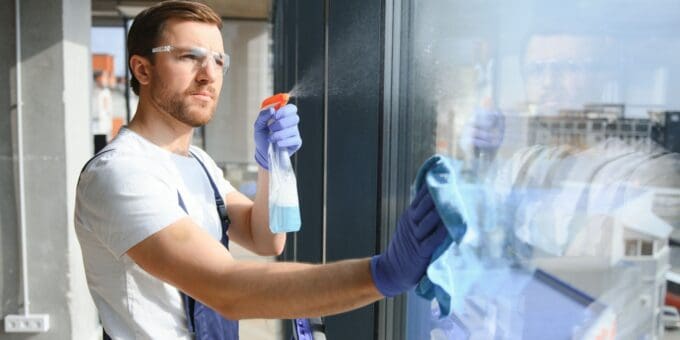If you’re looking for an active, outdoor, and in-demand business idea, starting a window cleaning business could be a great option. Its payoff can also be much higher than you might expect, especially if you’re a commercial window cleaner and are not afraid of heights.
In this blog, we’ll take you through the key steps to starting a window cleaning business with Rapid Formations. From choosing your market and getting registered to promote your services, this post will tell you everything you need to know about becoming your own boss as a window cleaner.
Key takeaways
- Choose between domestic and commercial markets to align with your resources and long-term business goals.
- Invest in quality equipment to enhance service delivery and customer satisfaction from the outset.
- Develop a comprehensive business plan to navigate challenges and outline financial projections effectively.
1. Choose your market
The first step to starting a window cleaning business is choosing your market. Will you be a domestic or commercial window cleaner? While you could earn more from commercial window cleaning, it’s easier to start as a domestic cleaner, especially if you’re doing so on your own.
Domestic window cleaning primarily involves residential homes. As a commercial window cleaner, however, you’d work with other businesses, taking on larger, more complex jobs – sometimes at considerable heights. For this, you’re likely to need more specialist equipment, a team of two or three people, and undergo specific training.
Don’t worry, this isn’t a final decision. For example, you can start as a domestic window cleaner and expand into commercial services once your business grows.
Equally, you can service both markets straight away. However, this will increase your start-up costs, so it really depends on your available resources and business objectives.
At this stage, you should think beyond your target market. What will make your window cleaning business different from—and better than—others? Perhaps you’ll use sustainable cleaning products, or you’ll reach your customers quicker than your competitors.
If you’re unsure how to answer some of these questions, we recommend looking at what your future competitors are doing—or not doing. It’s also worth researching the latest industry tools to ensure that you’re up to date with your customers’ needs and expectations.
2. Work out your start-up costs
Now that you’ve chosen your market, you must work out your financials. You should account for every expense, no matter how small, to find out exactly how much it’ll cost to start a window cleaning business. The good news is that window cleaning is generally a low-cost business to set up, especially in the domestic sector.
You might already have some of these covered, so they might not all apply, but here are the main costs associated with starting a window cleaning business:
Cleaning equipment
One essential start-up cost will be sourcing your equipment. You won’t need every piece of equipment right away—just the basics to get you started, like a squeegee or two, mops, scrapers, spray bottles, and lint-free towels.
These basic items are generally inexpensive. For a new business owner, there’s no need to jump to top-of-the-range squeegees straight way (yes, high-end squeegees do exist), but you also shouldn’t opt for the cheapest options on the market.
The cheaper items are great for homeowners cleaning their windows, but a professional window cleaner should invest in higher-quality equipment to deliver a better service. A basic, traditional window cleaning starter pack will cost around £60-£80.
- Different types of business structures for your startup
- Writing a business plan
- 10 businesses you can start from home
A water purification system is another essential tool to ensure that the windows you clean are streak-free and your customers are happy. There are a few different options, such as a DI vessel.
These containers are filled with resin, which filters hard water. Depending on the size, they cost roughly £90. Remember that the more windows you clean and the harder the water you use, the more resin you’ll get through. So, you’ll need to factor in the cost of replacing this tool regularly.
Another option is an RO filter system. These are great if you’re dealing with a larger quantity of water. They’re also more cost-effective than DI vessels as they tend to last longer and don’t need to be replaced as often. However, their initial cost is much higher at around £350.
Additional tools
If you’re prepared to deal with heights, you’ll also need a good-quality extendable ladder, which should cost between £130 to £500. Depending on the length, you will also need an extendable water-fed pole, which costs around £180.
These specialist tools will allow you to service a wider range of customers, many of whom don’t have the facilities to clean their windows on the second or third floor.
Business vehicle
If you don’t already have one, you need a van for your window cleaning business. This is essential not only for transporting your equipment but also to appear professional to your customers.
For a domestic window cleaning business, a small van will suffice. However, if you’re going to be a commercial window cleaner, you’ll have more and larger equipment to carry, so you’ll need a bigger vehicle.
It’s important to factor in the purchase price of your vehicle as well as the running costs. If your window cleaning business is going to focus on sustainability, then you’ll be looking at electric or hybrid vans, which could be more expensive to buy than petrol, but cheaper to run.
Be sure to shop around thoroughly for the right vehicle.
3. Price your window cleaning services
Your window cleaning business is nearly ready to go. You just need to determine how much you’ll charge for your services. The easiest way to start is to see what your competitors are doing.
Look up other window cleaning businesses in your area and get a rough idea of their prices. Do they charge one-off fees or monthly subscriptions? Maybe they charge per window rather than per hour.
You should avoid charging considerably more than your competitors as you’ll risk losing customers. Equally, your window cleaning services shouldn’t be priced much lower either, as it could cause customers to doubt your quality of service.
Remember to factor in the industry average, too. According to Checkatrade, window cleaning business owners earn around £30.08 per hour in the UK. However, this will fluctuate depending on the type of job you take on.
For instance, you could charge as little as £10 for a one-off domestic window in a small flat or £80 for a detached house. Or, if you’re dealing with awkward, hard-to-reach areas like conservatories, you could charge even more.
If you’re a commercial window cleaner, your prices could be as high as £60 per hour. Not only are these larger-scale jobs, but they can also be more dangerous.
4. Write a business plan
Writing a comprehensive business plan is essential to determining the viability of your window cleaning business. This document will help you plan the first two years of your company’s life, perform a market analysis, prepare a sales and marketing strategy, and outline your financial projections.
Crucially, it will also allow you to determine the challenges of your new business and decide how to overcome them.
No one knows your business better than you, so you may want to write your business plan yourself. There’s plenty of guidance available online, like The Prince’s Trust template. However, this document can get complicated, so it’s worth getting professional advice from a business advisor or accountant.
5. Incorporate your window cleaning business
Many window cleaners are self-employed, also known as sole traders. It’s cheaper to get started, you’re in complete control of your business, and you have simplified accounting and filing responsibilities. However, you’re also personally liable for the business, risking your personal assets; also, raising finances can be more challenging.
Therefore, we recommend registering your window cleaning business as a private limited company. You can still start as a sole trader and later convert to a limited company, or you can register immediately.
Incorporation offers the following advantages over the sole trader business model:
- Limited liability protection, shielding your personal assets if the business fails
- Customers generally find them more trustworthy and credible
- It can be easier to grow your business by bringing on additional shareholders and directors
- You have the option to pass the company on through inheritance or sell it
- Enjoy greater tax savings via Dividends Tax, which is taxed at a lower rate than Income Tax
- Most lenders trust limited companies over sole traders
Operating as a sole trader may be easier in the short term, but incorporation is beneficial for protecting your business and its owners in the long run.
Rapid Formations can help you register your window cleaning business in four simple steps. All you need to do is:
- Choose your company name
- Choose one of our company formation packages
- Complete your order
- Enter your company details
Company formation packages start at just £52.99 (including the Companies House filing fee of £50), and come with electronic delivery of your incorporation documents, and a digital copy of your company’s statutory registers. Multiple freebies, like a free domain name, lifetime business support, and a business bank account referral, are also included.
6. Regulations for window cleaners
As a window cleaner, you’ll need to follow specific regulations.
Working at Height
Whether domestic or commercial window cleaner, you’ll often need to work at a height. In this case, you’ll need to adhere to the Work at Height Regulations 2005. These rules state that you must ensure the following:
- All work at height is properly planned and organised
- Those working at height are competent
- You run a proper risk assessment
- Fragile surfaces are properly controlled
- Your equipment is properly inspected and maintained
Ladder restrictions
You cannot use ladders to access windows higher than four metres (13 feet). For ease, most window cleaners use water-fed poles instead, which allow them to safely reach windows at a considerable height.
Using specialist equipment
If you use specialist equipment to clean windows, such as a harness, scaffolding, or cherry picker, you’ll need to obtain appropriate training. Otherwise, window cleaners do not need to undergo specific training.
If you’re based in Scotland
Window cleaners in Scotland need to obtain a licence from their local council before providing their services.
Safety accreditations
This isn’t essential, but you should consider obtaining safety accreditations to boost your credibility and show your customers that your window cleaning business complies with health and safety rules.
The Federation of Window Cleaners offers a comprehensive programme called the Safety Accreditation Scheme (SAM), which covers safe window cleaning, how to use your equipment, and risk assessment training.
7. Insure your window cleaning business
Next, it’s time to get the right insurance for your window cleaning business.
Public liability insurance
As your customers are members of the public, public liability cover is crucial. This protects you from any claims made against you for injury or illness that could be caused on the job due to your services – for example, if someone trips on your equipment or slips on a wet surface.
Public liability insurance is also essential if you use certain chemicals in your window cleaning products that could cause harm or irritation to others.
Tools and equipment cover
As a window cleaner, you need certain tools to do your job well. You should protect your equipment with tools cover to ensure you’re not left out of pocket if something breaks or is stolen.
Goods in Transit insurance
Another useful type of insurance to have is Goods in Transit cover. This protects your tools from theft and damage when you’re on the road, which your standard van insurance won’t include.
Directors’ and officers’ (D&O) insurance
Now that you run a limited company, you have certain legal obligations if you’re an owner and director. This type of insurance covers you in case of compensation claims made against you as a director.
Vehicle insurance
Last but not least, don’t forget to insure your van with the right insurance that permits you to use it for business purposes.
Remember to shop around for all your insurance needs to find the right deal. The easiest way to do this is to use price comparison websites like Go Compare and Compare the Market.
8. Find your first customers
Now that your window cleaning business is set up, it’s time to promote your services and find your first customers.
Create a Google Business Profile
A Google Business Profile makes it easier for customers to find you on Google. More specially, when they search for window cleaning services in their local area, both Google Search and Google Maps will connect them with your company. Ultimately, your brand gets more visibility, and your website gets more traffic.
But that’s not all. A comprehensive Google Business Profile can help your new window cleaning business stand out, make a great first impression, boost your credibility, and engage with your customers.
To create your profile, sign up for a free Google Business Profile and follow a few quick and simple steps.
Join a traders’ marketplace
Join dedicated traders’ marketplace platforms like Checkatrade and Taskrabbit to make it easier for customers to find you. With an established reputation and traders directory, these sites are an excellent way to get discovered by customers and connect with other professionals in your industry.
These marketplaces are also great for instilling trust in your future customers. They assure potential customers that your window cleaning business has passed the site’s rigorous checks and provide them with a guarantee if anything goes wrong. Therefore, they’re more likely to give your services a go.
Word of mouth
Word of mouth remains a powerful marketing technique for trade services like window cleaning. Once business starts to pick up and your customers are satisfied, they’ll be excited to recommend your window cleaning business to others.
To boost its effectiveness, you could consider a referral or introductory offer and entice clients to choose your services over others.
Set up a website
Every business needs a website. Without one, people cannot find you and learn about your company.
Your website’s main purpose will be to educate visitors about your window cleaning services and key selling points. It’s also a great opportunity to showcase your personality and background as a business owner, which could help people connect with and trust your business more.
Start with a basic design. Web hosting platforms like WordPress and Wix offer many templates to help you get started, or you could find a low-cost freelancer designer to create something bespoke for you. Don’t forget to use the free domain name included in your Rapid Formations company formation package.
Thanks for reading
Window cleaning is a great business idea for outgoing, customer-focused entrepreneurs. It doesn’t cost much to get started and if you register your window cleaning company with Rapid Formations, we’ll help you every step of the way.
Thanks for reading. We hope you found this blog useful and inspiring. If you have any questions, feel free to post them below.
















Join The Discussion
Comments (2)
This was an awesome read! These window cleaning business starting tips also provided me with some management hints for my own expert financial advice UK business.
Great to hear, David! We’re glad the tips were helpful for managing your financial business.
Kind regards,
The Rapid Formations Team